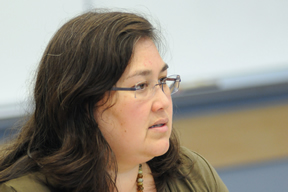A former law professor denied tenure at the University of British Columbia has launched a human rights complaint against the school, alleging it discriminated against her.

Lorna June McCue, who is of aboriginal race and ancestry, was turned down for tenure in June 2011 after 13 years at UBC’s Faculty of Law, before the university declined to reappoint her for the 2012/13 academic year. She alleges the decision was discriminatory on the basis of race, colour, ancestry, place of origin, marital status, family status, and sex.
In an
Oct. 12 decision that rejected part of McCue’s claim for late filing, B.C. Human Rights Tribunal Chairman Bernd Walter summarized her complaint.
“Ms. McCue alleges that her culturally-traditional approach to teaching and scholarly activity, have been under-valued” in the tenure and salary review processes, and that her situation “shows a pattern of systemic discrimination against non-traditional indigenous scholars and women,” Walter wrote.
The university denied any discrimination in documents filed with the tribunal, which has yet to decide on the merits of McCue’s complaint.
McCue joined the law faculty in 1998 as an assistant professor, before landing a tenure track appointment in 2000. A normal tenure track cycle takes seven years, but McCue claimed hers was delayed by parental leave, as well as health and family matters that had an impact on her work. She applied for tenure in June 2009, but was rejected by the university’s president in 2011. McCue has also appealed that decision, according to Walter’s ruling.
According to Walter’s decision, McCue claims the university failed to address discriminatory student evaluations of her 2005 first-year property law course, and then relied on them in part when making the decision to deny her tenure.
She also claims she was underpaid during her time on the faculty, having been turned down 12 years straight for merit pay awards between 2000 and 2011. During that time, she did receive four “performance salary adjustments,” but her pay has been static since 2009, says Walter’s decision.
According to the
Vancouver Sun’s
database of public sector salaries, McCue was paid $110,000 in the 2010/2011 fiscal year.
“Ms. McCue says that her compensation has been affected because her scholarship has not been appropriately assessed, or, it has been assessed and considered in a manner which does not properly value the significance of her non-traditional approach to scholarship as an aboriginal woman and is discriminatory on the basis of her ancestry,” Walter wrote.
Walter ruled the tribunal could only consider McCue’s salary denials from 2009 to 2011, rejecting the ones from earlier years as untimely.
He also refused to accept her allegations that she was denied study leave in 2010 for discriminatory reasons because they were filed outside the six-month limit. McCue wanted to join her husband in California, where he was travelling for a fellowship at Stanford University, starting in July 2010. McCue applied verbally for study leave in April 2010, but was rejected because she had not made a formal application and because the university said they needed her for teaching, according to Walter’s decision.
At one stage, McCue claims the university offered to approve a combined compassionate and study leave as long as she agreed to resign her position, but an agreement couldn’t be reached and she was turned down again.
In November 2010, McCue claims she was granted study leave from July 2011 to June 2012, contingent on her tenure application. When the answer came back negative, she was told she was no longer eligible for study leave.
Walter ruled the 2011 study leave complaint was timely, and could be heard as part of McCue’s claim that her tenure application was discriminatorily denied.
Update: Oct. 26: UBC spokeswoman Lucie McNeill confirmed McCue's employment with the university ended on June 30, 2012, but declined to comment on the specifics of the case because it is still before the tribunal. "The university is committed to providing fairness and equity in its workplaces. UBC takes all complaints of discrimination very seriously," McNeill said in a statement.

 Lorna June McCue, who is of aboriginal race and ancestry, was turned down for tenure in June 2011 after 13 years at UBC’s Faculty of Law, before the university declined to reappoint her for the 2012/13 academic year. She alleges the decision was discriminatory on the basis of race, colour, ancestry, place of origin, marital status, family status, and sex.
Lorna June McCue, who is of aboriginal race and ancestry, was turned down for tenure in June 2011 after 13 years at UBC’s Faculty of Law, before the university declined to reappoint her for the 2012/13 academic year. She alleges the decision was discriminatory on the basis of race, colour, ancestry, place of origin, marital status, family status, and sex.